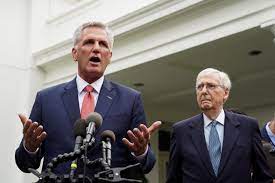Marc A. Thiessen
‘‘It is very simple,’’ Polish President Andrzej Duda told me last week. “Right now, Russian imperialism can be stopped cheaply, because American soldiers are not dying.” But if we don’t put a halt to Russian aggression now, “there will be a very high price to be paid.”
During an hour-long conversation in the Presidential Palace here, Duda noted that Poles have experienced 600 years of Russian efforts to subjugate them and their neighbors. In the 18th century, Russia helped partition Poland, wiping it off the map for 123 years. In 1920, the Bolsheviks attacked “in the hope of spreading communism across the whole of Europe” but were stopped by Polish forces in the Battle of Warsaw. In 1939, the Soviets attacked again alongside Nazi Germany and “Stalin seized half of Poland, bringing it under Soviet occupation” – until Hitler turned on his Soviet allies. Then in 1945, the Red Army retook Poland and “pushed the German occupiers out only to replace them with their own occupation,” resulting in “an additional 44 years behind the Iron Curtain.”
Now, Duda says, we are witnessing a “resurgence of Russian imperialism” – starting with Moscow’s 2008 invasion of Georgia, its 2014 attack on Ukraine, its full-scale invasion last year – and its “repeated threats directed at the Baltic states, Poland and all of Central Europe.” Vladimir Putin and his cronies “are dreaming of power of the czars and the restoration of czarist territory.” We must stop Russia’s advance in Ukraine now “so that it does not come to pass, as it did in World War I and World War II, that American soldiers have to shed their blood and to lose their lives in Europe to restore peace and liberty to the world.”
When I pointed out that about one-third of House Republicans recently voted to cut off aid to Ukraine, Duda showed no concern. “This is because you have democracy and you are free not to be like-minded,” he told me with a smile. Indeed, Duda is facing an anti-Ukraine revolt of his own. The far-right Confederation coalition – which has promised to “stop the Ukrainization of Poland” – is at 13 percent in the polls, making it the third-most-popular in Poland. If neither Duda’s Law and Justice party nor the centrist opposition secures an outright majority in October’s parliamentary elections, Confederation could become kingmaker in the new Parliament.
In other words, Duda’s bold support for Ukraine is politically courageous. Unfortunately, in the United States, most of the leading Republican presidential candidates are not showing similar courage. Is Duda worried what will happen to American support for Ukraine if Republicans win in 2024? “No,” he said, “I have no doubt that the United States understands perfectly the threat posed by Russian imperialism.” “And it is my profound belief that the United States also understands how important it is to make sure that democracy does not disappear from Central Europe. Everyone knows that where Russia is, there is no democracy.”
Right-wing governments in Poland and Italy seem to understand this and are strongly supportive of Ukraine. But Hungarian Prime Minister Viktor Orban has openly embraced Putin and questioned Ukraine’s sovereignty. I asked Duda why he thinks Orban is so wrong on this issue. “We have different historical experience,” he said. “In many countries in Southern Europe, Russia brings very positive historical associations because she liberated them from occupation by the Ottoman Empire. In Poland, Russia was only an occupying force … never a country that brought us liberty.” Moreover, he said, while Poland prepared for this moment by diversifying its energy supplies, “Hungary is to a very large extent energy-dependent on Russia. The only nuclear power plant that they have was built back under communist times. … All their gas supplies come from Russia. Some would say this is a political mistake, and I agree.” With military support, humanitarian relief and taking in refugees, no nation has done more for Ukraine than Poland. “Just our military assistance to Ukraine alone, we have sent more than $2 billion,” he said. “Poland has given Ukraine almost our entire fleet of our MiG-29s. We have given Ukraine more than 300 tanks as well, including the most modern, state-of-the-art German Leopards.” This assistance benefits not just Ukraine but the United States as well. For example, Poland recently sent Ukraine Soviet-designed Mi-24 attack helicopters and is buying new US-made Black Hawks and Apaches to replace them – creating US jobs. Poland has also accepted more Ukrainian refugees than any other country, and an estimated 77 percent of Poles have been involved in helping these refugees in some way, including donating more than $2 billion out of their own pockets.
Though the vast majority of Poles still welcome Ukrainians, “there is definitely a problem of war fatigue,” Duda said. “There are families in Poland who have had Ukrainian families living in their homes, sharing the same space, for a year and a half now.” And he noted that Poland’s history with Ukraine includes “some very difficult moments” – such as the massacre of as many as 100,000 Poles by Ukrainian nationalists toward the end of World War II. Duda recently visited the region of western Ukraine where the massacres mainly took place with President Volodymyr Zelensky – and was greeted by shouts of “Thank you!” and “Long live Poland!” Despite these challenges, Poles “are helping Ukrainians because they understand the Russian threat,” Duda said. “We know that when the Russians come, they rape women, they kill people, they deport people to the East. … [We] know that the Russians must be stopped.”
Ultimately, he said, this requires Ukraine’s admission into NATO. “I’m among those who hoped Ukraine would be given more than they actually got” at last month’s NATO summit in Vilnius, Lithuania, where the Biden administration scuttled efforts by the majority of allies to set a specific timetable for Kyiv’s admission. “Of course,” Duda said, “we cannot accept a new country into NATO while there is still war going on in that country. … But I had hoped that we would be able to get an invitation extended to Ukraine to shut down any question of whether Ukraine will be a member of NATO sometime in the future.” He said he will push the Biden administration to make sure Ukraine gets that invitation at the alliance’s 75th-anniversary summit next year in Washington. If it doesn’t have NATO’s mutual-defense protections, will Putin ever give up on his quest to conquer Ukraine? “It isn’t a matter of whether Putin or other Russian leaders will stop wanting to rule Ukraine one day. They may want to rule the whole world,” Duda said. “The question is: Will we let them? … I think we mustn’t allow them. We must not tolerate the changing of borders in Europe by force.” He is right. It would be nice to hear the leading Republican presidential contenders speak with similar moral clarity – and for President Biden to finally back concrete efforts to bring Ukraine into NATO.
The Washington Post







